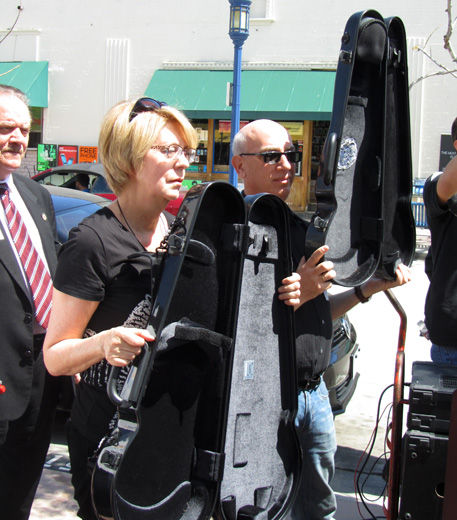
LOS ANGELES — Timed one day ahead of the April 11th official release date for the new film Draft Day, starring Kevin Costner, Jennifer Garner, and Frank Langella, a spirited demonstration took place in the Westwood neighborhood of Los Angeles, to protest the treatment of American studio musicians.
What’s the issue? These days, just about the first question any film producer asks is, “Where can I get the best tax credits?” Los Angeles, home of the Hollywood film industry, has suffered the loss of production for many years, as movies get lured by tax incentives and lower labor costs to film in Canada, Europe, and other faraway locations.
Lionsgate Entertainment, creators of Draft Day, for example, received $4.9 million in tax credits from Ohio taxpayers to film in that state. Actors and stage workers were apparently treated well and fairly. But post-production, when the film is scored, i.e., the soundtrack is recorded, Lionsgate did not hire American Federation of Musicians (AFM) professionals. Not in Ohio, not even in the United States. Instead, they hired an orchestra in Macedonia!
As Glen Arnodo, chief of staff for the Los Angeles County Federation of Labor, said, “Some people think music drops from heaven. But it doesn’t. It takes talented union musicians to make music. When you take taxpayer money from Americans you sign up to be a member of the team.”
Founded as an independent studio in 1997, Lionsgate had revenues of $2.7 billion in 2013, the fifth highest grossing studio at the box office. It is responsible for the “Twilight” and “Hunger Games” series, the new film “Divergent,” and “Mad Men” on TV.
Ray Hair, international president of the AFM, pointed out that since 2011 Lionsgate has sent 20 of its films abroad for scoring, and kept only four in the U.S. “This seems to be a habit with them,” Hair said.
Speakers from the AFM were joined by others from a broad range of labor, community, political, and faith groups. Los Angeles City Councilmember Paul Koretz lamented runaway production from a local economy largely based on film and television. “It’s not just about the big producers and the stars,” he said, “it’s for all workers down the line.” Koretz supports tax credits to keep jobs local, “But we’re paying to lose jobs. Lionsgate, you can’t keep doing this! Keep film music here in the U.S.!”
The AFM has launched a Listen Up! campaign to inform the public of the problem. “Recording a domestic film’s music score overseas,” says the union, “robs U.S. musicians and our communities of good jobs, deprives local economies of money that would otherwise have gone to public services and social programs, and undermines domestic musical culture and history.”
One demonstrator, Pam Goldsmith, a viola player, has been a member of AFM Local 47 since 1958. In those days, all the big studios retained their own orchestras under union contract. “I have watched the work disintegrate,” she told me. “Nowadays work is just drying up. It’s all freelance now. Corporate greed is damaging the American way of life. People can’t make a living because the companies are going to Macedonia. It’s a sin and a crime.”
It’s not just the musicians and their families who feel the heat. Those wages paid to American musicians would have kicked in funds to Social Security and Medicare. The nation as a whole suffers from the global race to the bottom.
Musicians, and the labor movement with them, are telling Lionsgate that it is unacceptable to exploit U.S. taxpayer dollars and then fail to offer the same standards to musicians as to the cast and crew working in the film industry. The battle is engaged, and the musicians are not prepared to give up until their work is valued at industry standards guaranteed by to agreements between the AFM and the motion picture producers.
The AFM got its start in the early years of the 20th century, when organists and small theater orchestras at silent movies were starting to be replaced by recorded sound. Now, says Ray Hair, with offshoring and outsourcing, “jobs have disappeared because the rich film companies have shoved us back into the silent era.” Violinist Rafael Rishik summed it up: “In this campaign, silence is NOT golden.”
The unions are NOT calling for a boycott of the film.
Photo: Violinist Rafael Rishik and Violist Jennie Hansen, with their “silent” instruments. Eric A. Gordon/PW












Comments